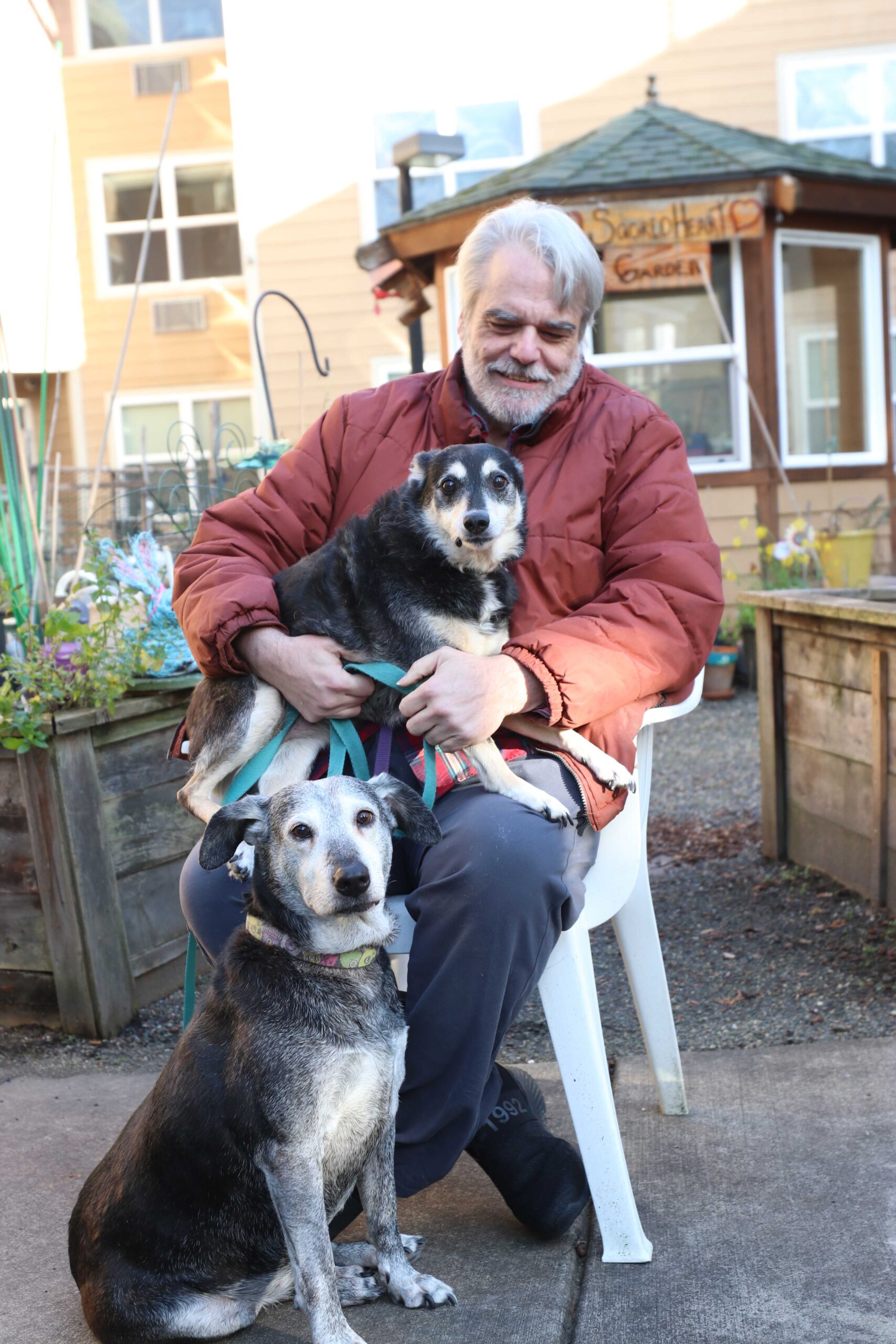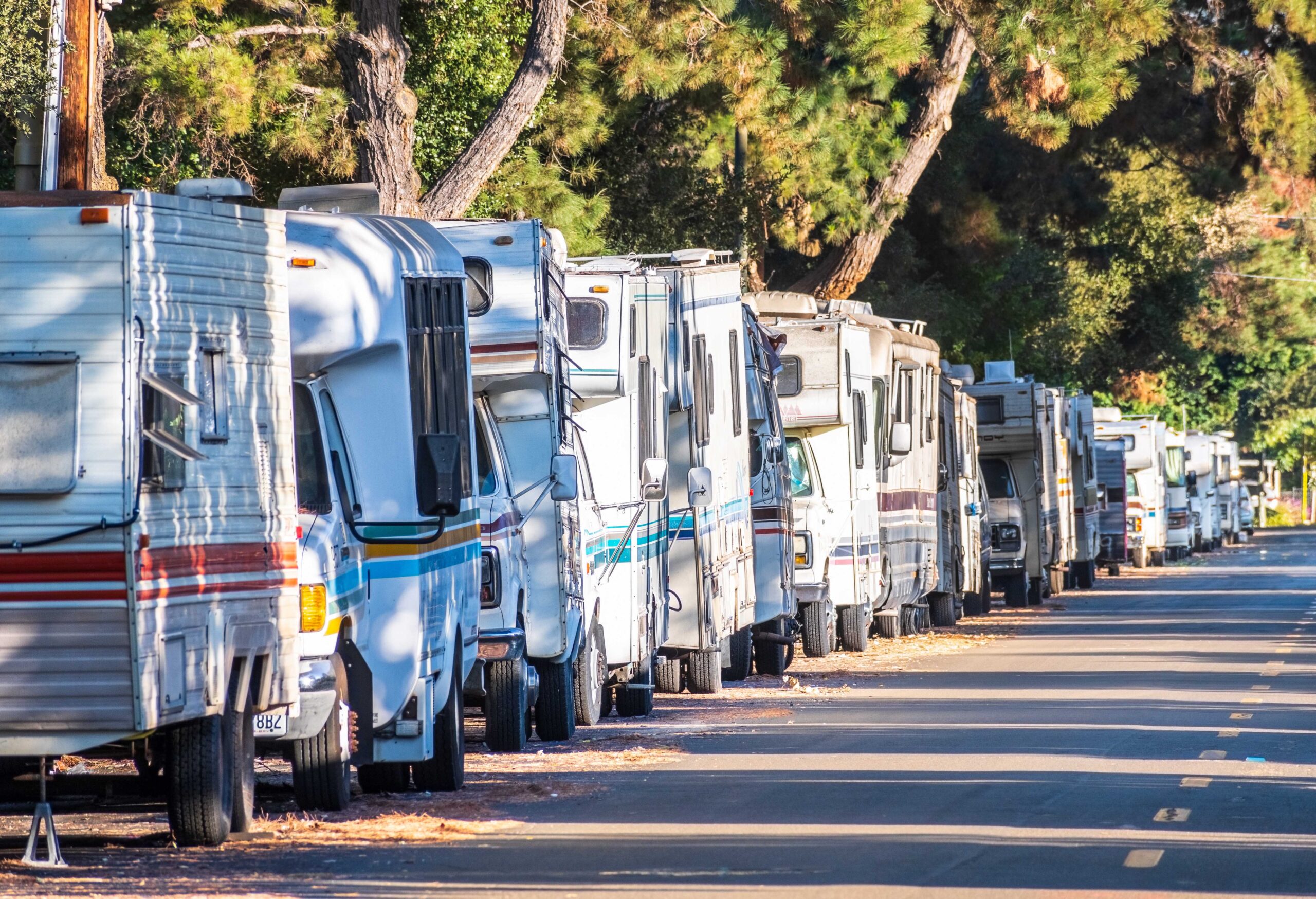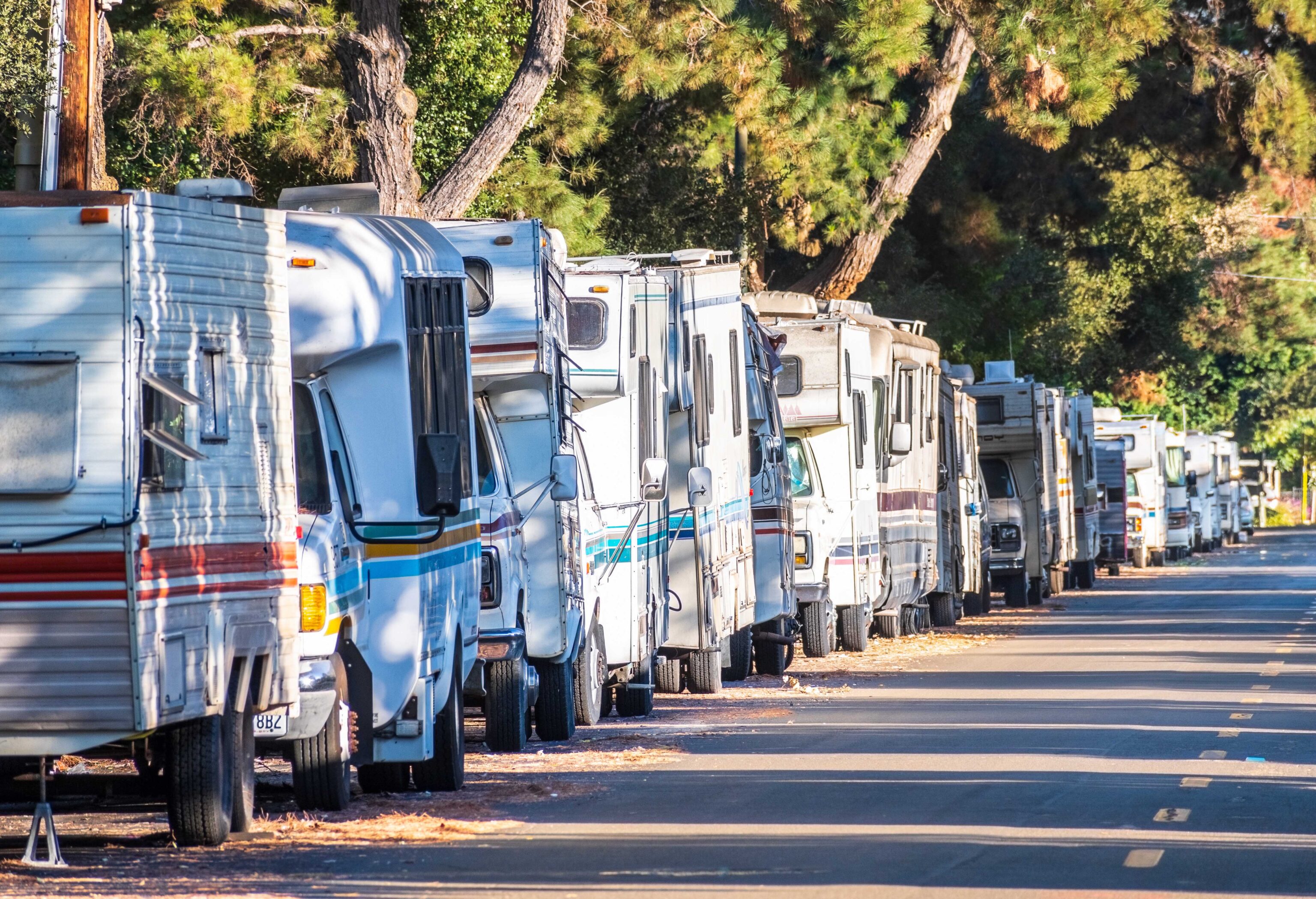One resident of Catholic Charities housing spent five years living in an R.V. Now he’s home.
After five years of living in an RV, Pat was overjoyed to move into a Catholic Charities apartment. A month later, on his 56th birthday, his dogs kept trotting to the door because they heard something in the hall. Pat opened up to find a pile of colorful notes.
“I’d never gotten so many birthday cards in my life,” says Pat, a gentle Marine Corps veteran who became homeless after a series of corporate layoffs, a work injury and the onset of heart disease.
There are many 50- and 60-something Oregonians like Pat yearning for a stable home as they face down aging and sickness.

Homelessness overall in Oregon is on the rise. Officials estimate that almost 23,000 Oregonians lack homes. That’s up 13.6% from 2023. The number of people in the state’s shelters rose 24% in the past year. The fastest growing segment of the homeless population is seniors. Almost 1 in 4 people experiencing homelessness is older than 55.
As Pat can tell you, homelessness can spring up even on a person who has lived an industrious life.
Born in California, he moved to Oregon with his family of eight when he was a boy. His father had retired from the Navy, where one of the duties was testing the atmosphere around nuclear test sites. When Pat, the youngest of six children, was 11, his father died of cancer.
Pat attend High School in Troutdale. After graduation, he entered the Marine Corps, serving in Japan at first. Then, on his 22nd birthday, he was sent to a port in Saudi Arabia for Operation Desert Storm. His job was logistics, making sure Marines had what they needed to survive.
As he puts it, his life was full of considering “bullets, beans, band-aids and bad guys.”
If a unit out in the desert needed a refrigerator to keep food and water cool, Pat figured out how to get it there and how to keep it working.
He also assisted the chaplain who had to deliver news from home. The best duty was telling Marines they had become fathers. The new dads at that base celebrated with cigars sent from Portland by Pat’s mother.
The worst was giving news of death and divorce. Before the chaplain got to the rough part, Pat would say to the Marine, “Here, buddy, let me hold your weapon while we talk.”
He enjoyed his Marine Corps duties and seeing sites of the world, like a herd of camels blocking a freeway.
It was an encounter with a new culture. He remembers when female Marines helping unload trucks would go down to t-shirts in the 120-degree heat just to survive, and Saudi men would sneak peeks, having rarely seen the female form.
After he completed his tours of duty, Pat returned to Portland where a friend suggested he get into banking. He landed a job at U.S. Bank, and it looked like a career, but then a merger hit and lots of positions, including Pat’s was eliminated.
He bounced back and worked for a credit card company, but it got purchased and the whole Beaverton office was laid off.
Undaunted, he earned a position with Comcast, which soon restructured and eliminated many Oregon jobs.
Pat moved on to Tri Met and started driving city buses. He loved the work, but while negotiating a sharp turn with that big steering wheel, seriously injured his shoulder.
He got light duty and physical therapy. But at one of his therapy sessions, he started to feel tired, dizzy and jumpy. The doctor found that his heart was racing and sent him to urgent care. The physicians there were alarmed and sent him to the hospital with a racing heart.
And so, at age 45, Pat became a heart patient, taking medications and occasionally needing to have his heart shocked back into proper cadence. He could not drive a bus with a condition like that, and so was laid off from TriMet. It was 2018.
Thinking he’d take a month-long break to heal and then start over, he sold his house in Aloha, bought an RV and took his dogs on a tour of Oregon.
But his heart troubles worsened. Between medical bills and being too sick to work, his money ran out. When he applied for jobs, employers didn’t like the fact that he had no brick and mortar address. He could no longer afford to pay for RV parks or campsites.
He began parking wherever he could, careful to stay away from large groups of RVs, where trouble often crops up. Even then, someone stole his truck’s battery and his propane tanks.

“Roughly every three weeks, I’d have to find a new spot where I’d feel safe,” Pat told the City of Portland in a recent interview. “My life was in chaos… being moved from location to location around the city, trying to find a place to …wouldn’t say live, but to survive.”
He worked hard to be a good citizen. He did not leave a mess outside his RV. He kept everything orderly and neat. When he saw people breaking the law, he called the police. The owner of a nearby business greatly appreciated Pat’s vigilance.
During this time, he met two city workers who noticed he as unique – no drugs, polite, tidy. They told him about a new city-run RV site where he could park at no charge.
Pat had to overcome five years of roadside trials and tribulations before he could trust, but he eventually moved in and made friends. But his health continued to decline. He and his dogs huddled under a blanket to stay warm.
One day while walking to a common area, his breath gave out and he felt awful. The park team called an ambulance and doctors discovered that Pat’s heart was pumping with only 30% of typical power.
He spent eight days in the hospital while park workers cared for his dogs. He threw an ice cream party for staff when he got back to his RV.
After a year at the park, because of his veteran’s status and health, Pat moved up the affordable housing wait list and was shown an apartment on the second floor of the Catholic Charities building where he now lives. He sold his RV and moved in July 2024.
While he waits for federal disability support to get approved, Pat has an exceedingly tight budget. He cooks all his own meals, often using items he has picked up at the food pantry held at his building monthly. It’s the best pantry he’s ever seen, he says.
And Ema, the resident services specialist at his building, helped him sign up for a subsidy from Portland General Electric.
“She said, here, let us help you,” says Pat, pausing to allow the sentence to serve as a sign of the beauty of his entire experience.
“I love having my own place,” he says. “My dogs love it with all that space. My dogs go do zoomies.”
Even during a winter cold snap, Pat didn’t turn on his heat. He and the dogs are accustomed to surviving brisk temperatures and are happy to huddle under the covers.
Pat, though he describes himself as “kind of reserved,” appreciates the communal life at his building. He likes going to the community room where people chat, play cards and work on puzzles. Then, for balance, he likes to sit quietly in his room and read espionage novels with his dogs.
Moving into a Catholic Charities property has been a huge help for Pat’s health.
“I am more stable,” he says. “I am in one spot. I can get my medications mailed to me. The people there within the community look out for each other.”
On occasion in the community room, Catholic Charities organizes a health fair where he can speak with an expert on heart health and see a nutritionist make a good meal from items found at the building’s pantry.
Asked what he’d say to someone who wants to get out of an RV into an apartment, Pat first recommends making connections with a helping agency. Get a case manager. Show up for your appointments. And be patient.
“It can sometimes feel like you take a step forward then get pushed back a step,” he says. “But keep on taking steps anyway.”
